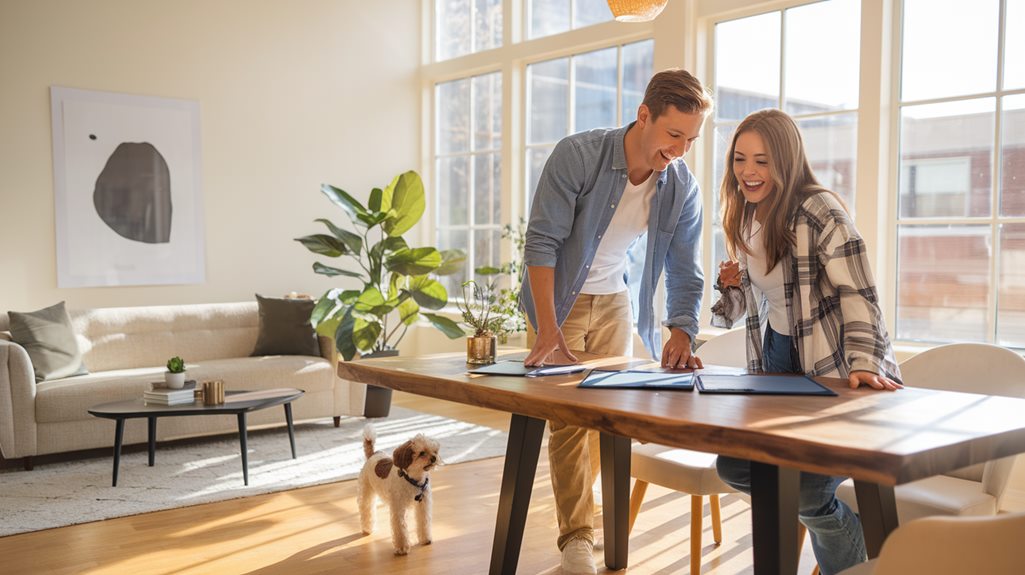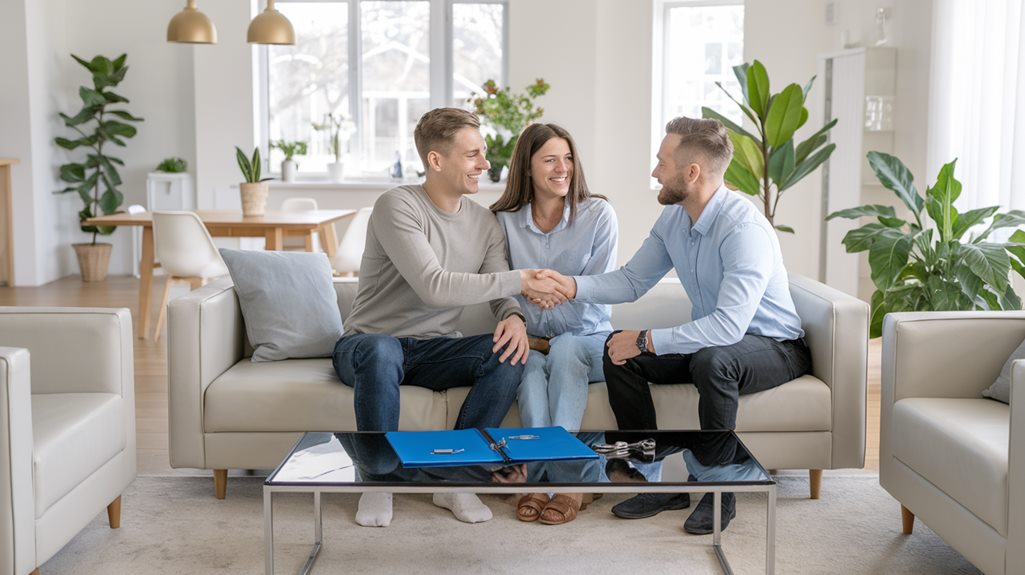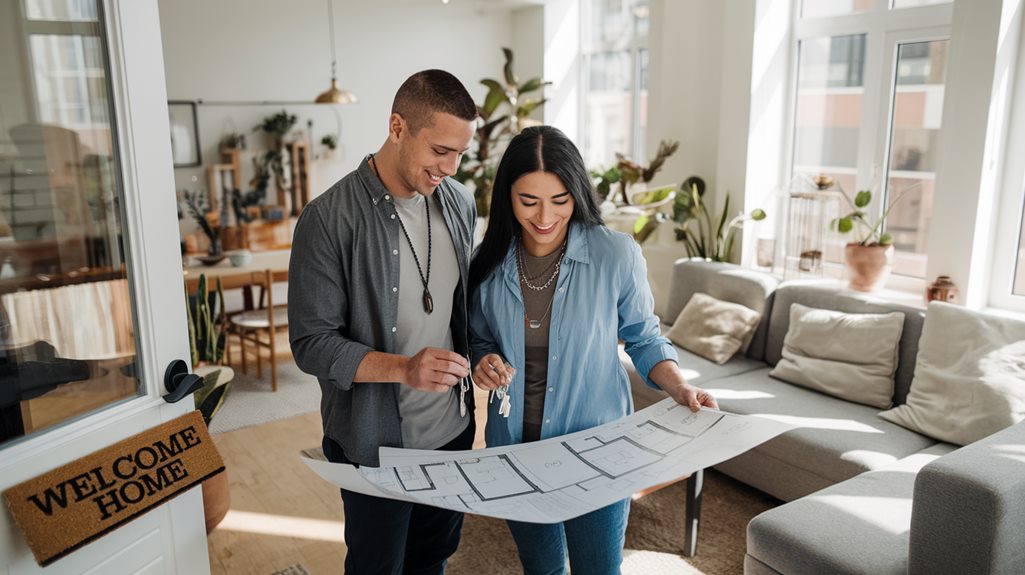You're about to buy your first home, and it's important to make smart choices. First, check how much money you have. Make a budget that shows how much you can spend on a down payment and closing costs.
Look into different types of loans and get pre-approved. This will help you when it's time to buy. Think about what you want in a home. It can be helpful to get a real estate agent who knows your area well.
Make sure to have a good look at the house to find any problems. Practice your negotiation skills so you can get a good deal.
Don't forget to include all the closing costs in your budget. Follow these steps, and you'll feel ready to buy your new home!
Ready to start building equity in your own Michigan home? Get your personalized home loan quote today.
Assess Your Financial Health

Before you start looking for a home, it's really important to check your money situation. First, look at your credit score. This number helps you get good loan offers.
Next, make sure you save money for emergencies. It's smart to have a little stash for when things go wrong.
Use simple budgeting tools to see where your money goes each month. Try to spend less and pay off any debts. This will help you keep your money steady.
Think about ways to invest your money for the future, too.
Don't forget to learn how owning a home affects your taxes. All these steps will help you feel ready and confident when it's time to buy your home. You want to be part of a group of smart homeowners!
Michigan residents, unlock the door to your new home. Request your home loan quote from Treeside Financial today.
Establish a Home Buying Budget
Making a budget for buying a home is really important.
First, look at how much money you spend each month. This will help you see what you can afford.
Next, think about how much money you can save for a down payment.
Remember to also think about closing costs. These costs can affect how much you spend and how you can negotiate when buying your home.
Calculate Monthly Expenses
Are you ready to buy your first home? It all starts with a good monthly budget. A budget helps you see how much money you have and how you can pay for a new home.
You might be closer to buying your home than you think
Take our 2-minute home buyer readiness quiz to see how prepared you really are – no credit check required.

First, write down all the money you spend each month. This means looking at things like your bills, groceries, and gas for your car. Don't forget to think about new costs like property taxes and fixing things around the house.
Next, check your debt-to-income ratio. This fancy term means how much money you owe compared to how much money you make. If your ratio is good, lenders will see you as a better choice to lend money to.
Determine Down Payment
When buying a home, it's important to know about down payments. A good plan can help you save money and get the home you want. First, look for programs in your area that help with down payments. These programs can make buying a home easier for you.
Here are some down payment options:
| Down Payment Option | Key Benefit |
|---|---|
| Personal Savings | Helps you save money |
| Down Payment Assistance | Lowers your starting costs |
| Gift Funds | You don't have to pay it back |
Try to save money for your down payment. Set goals that are easy to reach and think about using automatic savings. You can also talk to sellers about helping with closing costs. This can give you more money for your down payment. Remember, every little bit helps you get closer to finding a home you will love!
Factor in Closing Costs
When you buy a home, you need to think about more than just the money for the down payment.
There are also closing costs that can surprise you. These costs can be hidden and might catch first-time buyers off guard. It's important to plan for these costs, so you don't get caught by surprise!
Closing costs usually cost between 2% and 5% of the price of the home. That means you need to be clear about what you might pay.
Here are some things to think about:
- Loan application fees: This is the money you pay to get your loan ready.
- Title insurance: This helps protect you if there are problems with the property.
- Home inspection: This is a check-up for the house to find any problems before you buy it.
- Property taxes: These are taxes you have to pay when you close the deal.
- Attorney fees: This is what you pay for legal help with your papers.
Make sure you plan for these costs, so you're ready when it's time to buy your home!
Explore Mortgage Options

Why jump into buying a home without looking at all your choices first? If you're a first-time buyer, it's important to know about fixed rate and adjustable rate mortgages. You might also want to check out loans backed by the government. These can be easier to get. There are special programs just for first-time buyers that can help you too!
When you're looking for a lender, make sure to compare them well. This helps you find the best one for you. Think about how long you want to take to pay back the loan. This will change how much you pay each month. You can also lock in an interest rate. This keeps your rate safe from changes in the market.
Your credit score is important too. A good score can help you get better loan terms. Sometimes, you might want to think about refinancing later on. Knowing all of this will help you feel more confident and ready to make your new house a home!
Get Pre-Approved for a Loan
Getting pre-approved for a loan can help you buy a home.
First, learn what you need for the loan and check different interest rates to find the best one for you.
Then, collect all your important papers. This way, when you find the right home, you can talk to the sellers with confidence.
Understand Loan Requirements
If you're thinking about buying your first home, it's really important to understand what you need for a loan. This will help you feel good when you start looking for a house.
Here are some easy things to remember:
- Types of Loans: Learn about different loans like FHA, VA, and regular loans. They're all a little different.
- Credit Scores: Try to have a good credit score. A better score can help you get better loan deals.
- Debt-to-Income Ratio: Keep your debts low compared to your income. This can make it easier to get a loan.
- Down Payment: Think about how much money you can pay at the start. This is called a down payment.
- Documents: You'll need to collect papers that show your income, like pay stubs and tax returns.
Compare Interest Rates
Looking for a mortgage can be tricky, but it's important to pay attention to the details. You should carefully compare interest rates because they can change a lot. It's also good to know about fixed and variable rates. Fixed rates stay the same, which is nice for budgeting. Variable rates can be lower if the market is good, so they might save you some money. Don't just stick with one lender; check out different options and ask for better deals.
| Lender | Interest Rate Type |
|---|---|
| Lender A | Fixed |
| Lender B | Variable |
| Lender C | Fixed |
| Lender D | Variable |
| Lender E | Fixed |
Getting pre-approved for a mortgage is a smart move. It helps you know how much you can spend and makes you feel stronger when talking to sellers. This way, you can feel good about finding a home in today's busy market.
Gather Necessary Documents
Getting a mortgage pre-approval is an important step in buying a home. To do this, you need to gather some important papers that show you're ready to buy.
Here's a simple list of what you need to collect for your lender:
- Proof of Income: This can be your pay stubs, W-2 forms, or tax returns.
- Credit Information: You'll need your credit reports and scores.
- Assets Documentation: Bring your bank statements and details about any investments.
- Debt Details: This includes any loan statements and credit card balances.
- Identification: Make sure you have a government-issued ID.
To make everything easier, keep your documents neat and tidy. You can store them in labeled folders on your computer.
This helps you find what you need quickly. Being organized not only makes the pre-approval process faster, but it also shows sellers and agents that you're serious about buying a home.
This can help you feel more at home in the busy world of real estate.
Prioritize Your Needs and Wants

When you decide to buy your first home, it's very important to think about what you really need and want.
Start by making two lists: one for things you must have and one for things you'd like to have.
Must-haves are things you can't live without, like how many bedrooms you need or how close the house is to your work.
Your wish list can have nice things that would make your home more fun or cozy, like a big backyard or a shiny new kitchen.
Knowing what you want helps you feel good about your choices.
It also helps you talk better with the people helping you find a home.
Make sure to share your lists with your real estate agent.
They can help you find homes that fit what you're looking for.
Together, you can explore the market and find the right place for you!
Research Potential Neighborhoods
How can you make sure you're picking the right neighborhood for your first home? Start by getting to know the community.
Look at the people who live there to see if you feel at home. Check out what fun things are around, like parks, restaurants, and shops, because they can make your life better.
Safety is super important too; you want to feel safe where you live. Look for any new buildings or changes coming up that might change how much your home is worth.
Even if you don't have kids, good schools are important because they help with the value of your home later.
Think about these things:
- Who Lives There: Do you feel good about the people around you?
- Fun Places Nearby: Are there nice places to go close by?
- How Safe It Is: Do you feel safe in the neighborhood?
- New Buildings Coming: Will they help or hurt your home's value?
- Getting Around: Is it easy to go to work or school?
Take your time to learn about the neighborhood, so you can feel happy with your choice.
Partner With a Real Estate Agent

After you find the neighborhoods you like and decide where you want to live, the next step is to find a good real estate agent to help you.
An agent knows a lot about buying homes and can make the process easier for you. They understand the local market and can help you find the right homes to look at.
Your agent will talk to you often so you know what's happening. They can help you make a strong offer on a house you really want.
Going to open houses with your agent will let you see homes that fit what you're looking for. Many happy clients say that their agent made them feel welcome and safe during the buying process.
Working with a real estate agent means you have a friend by your side to help you through each step. You aren't alone on this journey!
Conduct Thorough Home Inspections
When you buy a home, it's really important to check it carefully. This is called a home inspection. It helps you see what's good and what might need fixing. You want to make sure you're spending your money wisely.
Here are some common problems you might find:
- Structure: Look for cracks in the walls or if the house feels uneven.
- Roof: Check if there are missing pieces or if water is leaking.
- Plumbing: See if there are any wet spots or rusty pipes.
- Electricity: Make sure the wires are safe and working properly.
- Heating and Cooling: Make sure the air system works well.
Doing this will help you know what needs to be fixed before you buy the house!
Master the Art of Negotiation

Negotiating when buying your first home is very important. You need to use smart ways to get what you want and show that you know the market well. Good communication helps everyone understand each other better.
Start by learning about the local market to find out how much the house is really worth. Having facts and numbers will help you feel strong in your position. Be clear about what you need and try not to get too attached to the house, so you can think clearly.
Try to be friendly with the seller. Being nice and respectful can lead to a good deal for both of you. Remember, you aren't just talking about money; you're also making a connection.
If you feel confident and ready, you'll feel like you belong in the community, making your home-buying journey a happy one.
Plan for Closing Costs
Buying your dream home is exciting, but there are important costs to think about. These costs are called closing costs. They can surprise you if you don't plan for them.
It's smart to know what these costs are and to try to lower them if you can. Here are some things to know about:
- Loan fees: This is money you pay to the bank for helping you get your loan.
- Title insurance: This helps keep you safe from problems with your home's ownership.
- Appraisal fees: This checks if your home is worth the price you're paying.
- Home inspection fees: This finds out if there are any repairs needed before you buy the home.
- Property taxes and insurance: You need to pay these when you close on your home.
When you learn about these costs and plan ahead, you can feel confident as a new homeowner!








